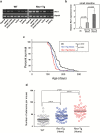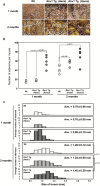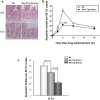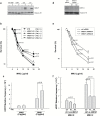Overexpression of Rev1 promotes the development of carcinogen-induced intestinal adenomas via accumulation of point mutation and suppression of apoptosis proportionally to the Rev1 expression level
- PMID: 28498946
- PMCID: PMC5872566
- DOI: 10.1093/carcin/bgw208
Overexpression of Rev1 promotes the development of carcinogen-induced intestinal adenomas via accumulation of point mutation and suppression of apoptosis proportionally to the Rev1 expression level
Abstract
Cancer development often involves mutagenic replication of damaged DNA by the error-prone translesion synthesis (TLS) pathway. Aberrant activation of this pathway plays a role in tumorigenesis by promoting genetic mutations. Rev1 controls the function of the TLS pathway, and Rev1 expression levels are associated with DNA damage induced cytotoxicity and mutagenicity. However, it remains unclear whether deregulated Rev1 expression triggers or promotes tumorigenesis in vivo. In this study, we generated a novel Rev1-overexpressing transgenic (Tg) mouse and characterized its susceptibility to tumorigenesis. Using a small intestinal tumor model induced by N-methyl-N-nitrosourea (MNU), we found that transgenic expression of Rev1 accelerated intestinal adenoma development in proportion to the Rev1 expression level; however, overexpression of Rev1 alone did not cause spontaneous development of intestinal adenomas. In Rev1 Tg mice, MNU-induced mutagenesis was elevated, whereas apoptosis was suppressed. The effects of hREV1 expression levels on the cytotoxicity and mutagenicity of MNU were confirmed in the human cancer cell line HT1080. These data indicate that dysregulation of cellular Rev1 levels leads to the accumulation of mutations and suppression of cell death, which accelerates the tumorigenic activities of DNA-damaging agents.
© The Author 2017. Published by Oxford University Press.
Figures





References
-
- Lawrence C.W. (2002) Cellular roles of DNA polymerase zeta and Rev1 protein. DNA Repair (Amst)., 1, 425–435. - PubMed
-
- Lawrence C.W. (2004) Cellular functions of DNA polymerase zeta and Rev1 protein. Adv. Protein Chem., 69, 167–203. - PubMed
-
- Ohmori H., et al. (2001) The Y-family of DNA polymerases. Mol. Cell, 8, 7–8. - PubMed
MeSH terms
Substances
LinkOut - more resources
Full Text Sources
Other Literature Sources
Molecular Biology Databases
Miscellaneous

